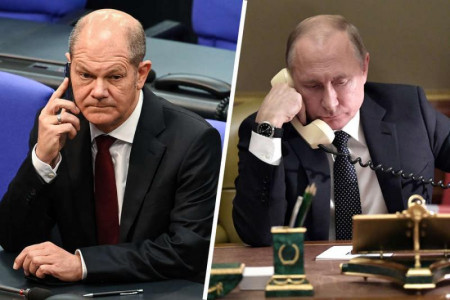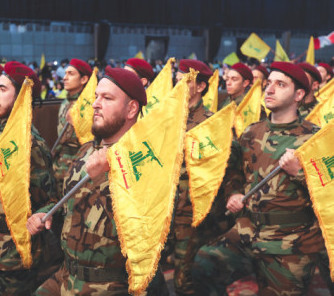
Over the past few months, German Chancellor Olaf Scholz has reiterated his willingness to call Russian President Vladimir Putin. When asked when this might happen, the Cabinet head invariably replied something like: "In due time." Finally, the "long-awaited" moment has come: US President-elect Donald Trump started promising to "resolve the Ukrainian crisis in 24 hours", Berlin’s tripartite coalition collapsed, and the government turned into a parliamentary minority one, with Scholz himself turning into a lame duck given the early Bundestag elections scheduled for February 23, 2025. And the most likely winner is not him but CDU leader Friedrich Merz, who has already threatened Putin with an ultimatum, not ruling out a phone call with the Russian President.
One between Putin and Trump is also a really likely option. By the way, Merz has accompanied his possible call to the Kremlin with a reservation about "collective" consent of the allies. As for Scholz, here we also see that he has discussed and gotten approval for his first contact with the Russian leader in almost two years with all the Western partners, including Zelensky. It seems that in the current context, it was important for Scholz to get ahead of Trump, Merz or Macron, to show that Germany and he personally still claim European leadership, despite the country’s economic and political crisis.
It is equally important for Olaf Scholz to proceed with the struggle for people’s votes ahead of Germany’s early parliamentary elections. After all, popularity ratings of the Social Democrats with him at the helm to once again take office as Federal Chancellor have been almost one half as high than those of the CDU/CSU bloc (15-16 percent vs. 32-34 percent) so far. Even to be a minor partner of the right-wing Christian bloc of parties in the future government, the SPD needs to bring public support to at least 20 percent and get ahead of the Alternative for Germany (AfD), which is gaining 19.5 percent of the vote, as recent polls suggest. And here, in addition to the promised reduction in taxes and increase in pensions, "efforts to end the war in Ukraine" will be useful indeed.
However, Scholz's demand expressed in his all but hour-long conversation with Putin "to end military operations in Ukraine, withdraw troops and begin negotiations to ensure just and lasting peace," as well as the pledge "to keep supporting Kiev as long as it takes," will hardly inspire followers of the AfD or the Sarah Wagenknecht Alliance (BSW)—Reason and Justice to vote for the SPD. After all, Stolz's stance does comply with views of German Russophobes demanding that the Kiev regime be promptly provided with Taurus cruise missiles to strike deep inside Russia.
Why did the Russian President agree to talk to Scholz anyway? Especially now that he has turned into a "departing figure", and Germany remains the second largest financial sponsor and supplier of weapons to Ukraine after the United States. German tanks with crosses on their armor have been firing at the Russian military and peaceful towns in the Kursk region and Donbass, with German mines maiming local residents. Perhaps it’s important that the German and other Western media were forced to voice Russia's stance on the situation in Ukraine, which they are rather reluctant to.
Before the ceasefire and any negotiations, Moscow particularly demands a withdrawal of Ukrainian troops from the Kursk, Donetsk, Lugansk, Zaporozhye and Kherson regions; recognition of the latter four plus Crimea as part of Russia; Ukraine's waiver of plans to join NATO and confirmation of its nuclear-free status; and lifted Western sanctions. Notably, the Russian leader has pointed to an unprecedented degradation of all the ties with Germany "as a consequence of its authorities’ unfriendly course." Perhaps this will make the burghers think about the true causes of their own economic crisis or at least doubt veracity of Scholz's recent false statement that "it was Russia who stopped supplying natural gas to Germany."
If we recall the times of Chancellors Schroeder or Merkel, Germany's permanently anti-Russian mainstream media tirelessly and regularly criticized the leaders for not communicating with Vladimir Putin "harshly and aggressively enough". This time, the media have favorably assessed Scholz's phone call to the Kremlin. Thus, the Tagesschau portal has formulated as many as four points about why it was "on time and right" that Olaf Scholz picked up the phone after all.
First, "the issue of war and peace is increasingly worrying the Germans," so it is necessary to distract them from supporting the AfD and Sarah Wagenknecht's party as they consistently advocate for a peaceful diplomatic solution to the Ukraine crisis. Second, the chancellor "was not acting in isolation but coordinated his phone call with partner countries," thereby avoiding the danger that "former intel officer Putin would get the better of him." Third, he outmarched Donald Trump, who "could have thoughtlessly said something favoring Russia, since the interests of Europe are of little concern to the US president." And fourth, Scholz's phone call became a "signal inward Russia" to remind it of the need to negotiate with Ukraine.
Meanwhile, Olaf Scholz's candidacy for the post of Federal Chancellor is still not unassailable. There are loud statements about contemplating and voting on the issue at the Social Democrats’ Congress. A proposal to that effect came from former SPD chairman Franz Müntefering, for one. In his opinion, such a vote would confirm the Social Democrats' existence as a "real intra-party democracy." The current SPD leadership has strongly rejected such initiatives, stating that the incumbent Chancellor should be the only candidate for head of government in February 2025. The predominantly grassroots SPD entities do not welcome this as the one popular with them is not Scholz but current Defense Minister Boris Pistorius.
For example, the Social Democrats’ Bochum assembly has stated that with Olaf Scholz as Chancellor hopeful, the upcoming election will only yield "a crushing defeat" to the party. Chairman of this local organization Serdar Yüksel told Stern magazine that if a poll is conducted among all the party members, "80 percent will turn out in favor of Pistorius", and that "the elections are not Scholz's personal business, but about the party’s entire existence." According to the DPA news agency, SPD leaders are expected to announce its final decision by November 30, when the so-called "Election Victory Conference" is going to take place. The decision on the SPD’s chancellor candidacy should be approved at the party congress on January 11, 2025.









